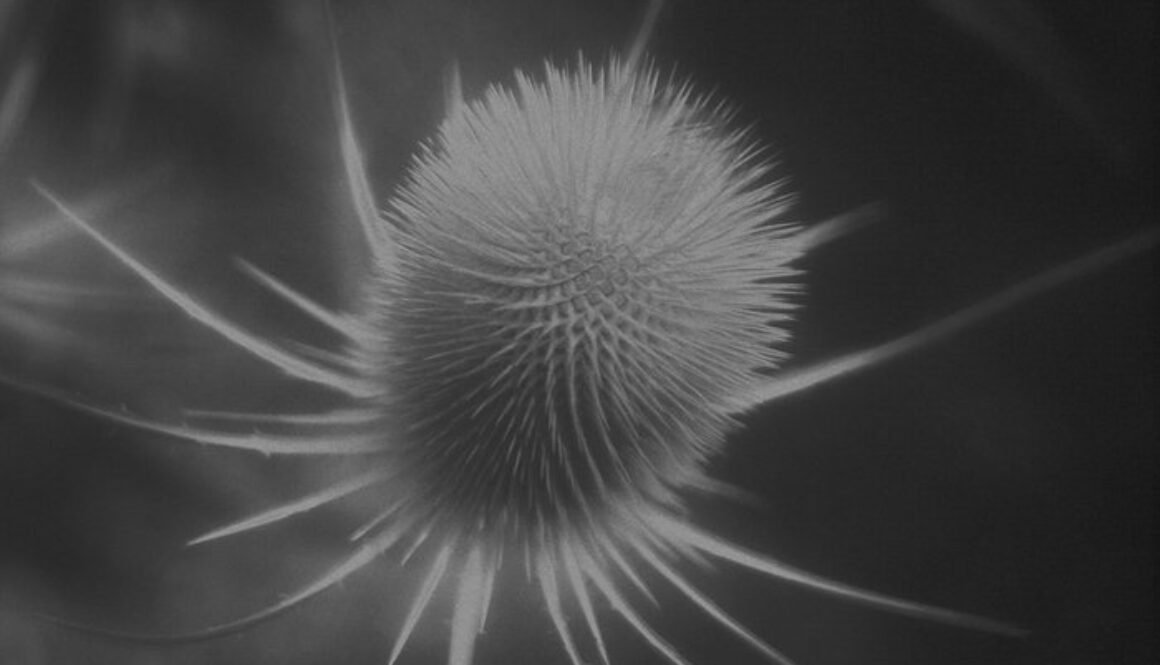ssabæ, “azurescens” (Few Crackles, 2022)
This is the third album from an enigmatic and self-described “nebula of friends gathering in studios, meadows and tiny apartments all over France” and fittingly borrows its name from a species of psychedelic mushroom. While the mushrooms, the meadows, and the mysterious revolving cast of musicians certainly all suggest that azurescens is likely to be packed with interminable and loose freak-folk jams, absolutely nothing could be further from the reality. In fact, the only real similarity to freak/outsider folk music is merely the timeless and hallucinatory vibe that this collective beautifully conjures. Someone in this nebula clearly knows their way around a studio and set out to craft an absolutely sublime, minimalist vision. Whoever it was, they succeeded quite beautifully (my money is on saxophonist Gwen Jamois, the given name of world-class crate-digger and electronic music producer lueke).
The album opens with its most eerie piece, “tous les murs sont des portes,” which sounds like a nursery rhyme recorded by either a cult or a coven of witches. It is also quite hauntingly beautiful though, as vocalist Margaux Delatour hypnotically chants a few French phrases over a stark backdrop of discordant autoharp strums, strangled saxophone squawks, and trippy dub effects. It is quite an ingeniously constructed piece as well, as Delatour’s sensual sing-song chant provides perfect the melodic grounding to free up the rest of the ensemble to unleash a quietly vivid and spatially mobile psychedelic storm of smeared drones, jangling chimes, and broken sounding arpeggios.While the rest of the album is considerably less witchy in atmosphere, the remaining songs can almost all be reasonably described as variations on the same killer theme, as each piece is built from a simple melodic motif that is immersed in a gorgeously lysergic swirl of otherworldly sounds and textures.
In the following “le matin,” for example, a delicate harp and a repeating bass line form the melodic backbone of the piece, but the atmosphere is largely driven by the surrounding sounds of singing birds and laughter (along with some subtly hazy synth shimmer). The overall effect is somewhere between Portishead DJing a sizzlin’ party at an aviary and a chamber music nightmare haunted by hollowly cheerful sounds. Elsewhere, “en équilibre” is a considerably warmer highlight, as Delatour wordlessly hums a pretty melody over a minimal backdrop of conversation and Spanish-sounding guitar. To my ears, however, the final piece on the album (“l’archipel fractal”) that is the real stunner, as a gently pulsing and glassy sounding melody languorously unfolds over a simple backdrop of still more Spanish-sounding acoustic guitar. It makes me feel like I am being serenaded by a heavenly dream calliope while napping on a beautiful patio overlooking the Mediterranean, but it is also mingled with a sense of unreality akin to living inside the tropical version of a snow globe.
That said, the title piece is another fierce contender for the album’s zenith, as Delatour’s melancholy and sensuous vocals initially evoke a torch song chanteuse performing an a cappella tour de force in front of a gently hissing waterfall. It gradually fleshes out a bit with some saxophone and light psychedelic magic in the periphery, but the real beauty lies in how Delatour’s voice lazily pans around spatially and sometimes feels incredibly close and intimate. That trick in particular captures the essence of what makes this album so fucking mesmerizing and immersive on headphones, as ssabæ distill their vision to such perfect simplicity that every single note and texture can make a big impact and potentially send shivers down my spine. This is an absolutely sublime and mesmerizing release.
Listen here.

